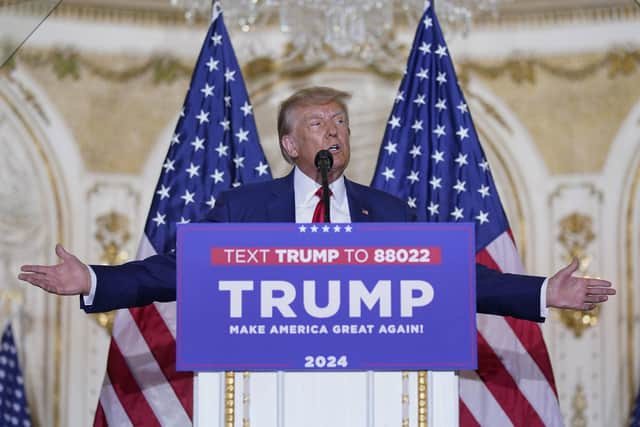Consumerism, not religion, is the altar at which society kneels with Easter traditions being sidelined - David Behrens
It’s not really surprising. Consumerism, not religion, is the altar at which society kneels. Besides, with so many adults setting a bad example, what hope is there for those who follow?
It used to be a tradition at Easter to parade through town – men and children in their Sunday best and women in their new bonnets. It was such an institution that MGM made a musical about it, with Fred Astaire and Judy Garland. Three-quarters of a century later, the only Easter parade in New York has been the unbecoming spectacle of Donald Trump making his way through the throng to have his fingerprints taken.
Advertisement
Hide AdAdvertisement
Hide AdTrump’s comeuppance is a metaphor for the wholesale abandonment of traditional values – not the least of which is plain old common sense – on both sides of the Atlantic. It needed no grand jury indictment to persuade most of us that he was, in the language of the MGM musical, a flimflam man. Yet he remains the favourite for the Republican presidential nomination next year.


It has been an unedifying spectacle to watch the descent of the world’s most propitious superpower into what can only be termed madness.
The rot didn’t start with Trump. As long ago as 1972 the satirist Mort Sahl was observing that in the nation of Washington and Lincoln the top two politicians were Richard Nixon and his corrupt vice-president, Spiro Agnew. “What do you draw from this?” pondered Sahl. “Darwin was wrong.”
It took people like him to point out such absurdities because mainstream TV and film seldom did. Hollywood had a vested interest in promoting the wholesome aspects of American life; it was good for the box office and it helped the studios secure favourable tax incentives. MGM and its counterparts were Uncle Sam’s standard bearers and proud to be so.
Advertisement
Hide AdAdvertisement
Hide AdThey didn’t have a complete monopoly on flag-waving but they were, in 21st century parlance, the dominant influencers. Most of the images of America shown to the world were filtered through the prism of the big studios. Couples like Fred and Judy were Mr and Mrs America.
Today, there are no filters. Any idiot with a mobile phone and a YouTube account can call themself a filmmaker. Contradictory views are amplified through the distorted echo chamber of social media and it’s left to users to pick their own truths. This was the poisoned garden of conspiracy theories in which the cult of Trump took root.
But his presidency was just one outcome of allowing society’s moral compass to be regulated by algorithms on the internet instead of free thought. The current storm in a teacup about the malign influence of TikTok is another warning of the need for a reality check.
It was on Tuesday that this Chinese-owned social media platform was fined £12.7m in the UK for not protecting its young users. As a consequence of its neglect, around 1m British children of 12 and under have had their personal information collected and reused.
Advertisement
Hide AdAdvertisement
Hide AdTikTok appeals especially to children because it lets them upload 30-second videos in which they can dance, sing and generally play the fool. Kids will be kids and they would rather do that than read a book, let alone go to church on Easter Sunday. And 30 seconds seems to be the average attention span of the generation we’re raising.
But Whitehall’s reaction – to ban the app from government phones – was puzzling. Why was it installed in the first place? Has official business been going undone because politicians were tied up filming themselves dancing around the office?
Those admitting to using TikTok include Grant Shapps and Matt Hancock, so draw your own conclusions. It’s probably only a matter of time before they convert the Commons bar into a Wacky Warehouse.
The problem lies not with any one app or person but with the malaise of thinking less and letting ourselves be hypnotised by shiny objects on our screens. Maybe it’s a necessary counterbalance to everything else going on around us, but ultimately it’s not good for anyone.
Advertisement
Hide AdAdvertisement
Hide AdThis weekend of renewal is a timely moment to question our sense of perspective. I’m no more religious than most people in Britain today but there is no comfort in the knowledge that there will be more of us in Currys on Black Friday than in church tomorrow.